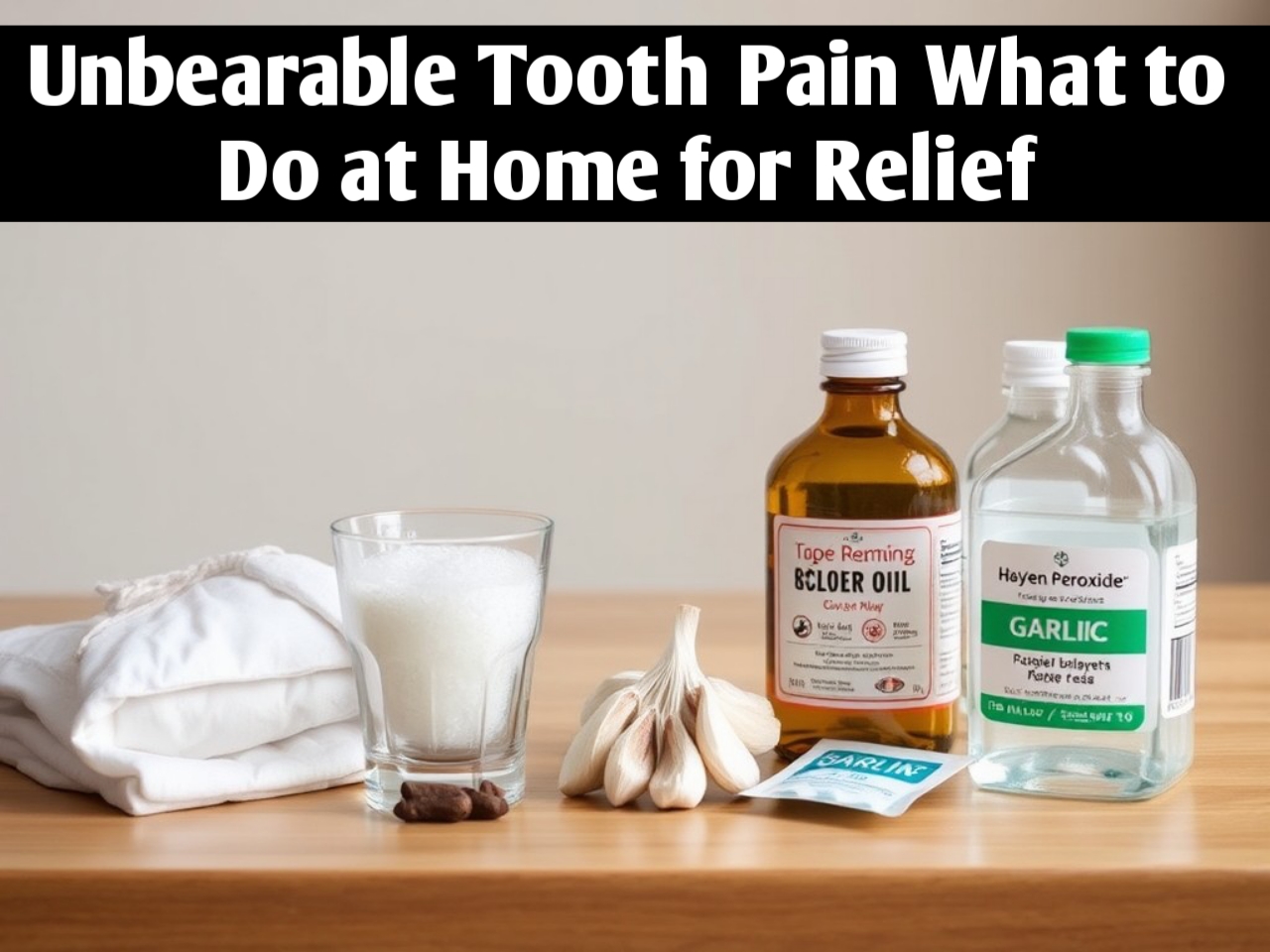Unbearable Tooth Pain: What to Do at Home for Relief
Tooth pain can be a crippling experience. It affects your ability to eat, talk, or even sleep. When the pain becomes unbearable, it’s easy to feel desperate for relief. Many people are unsure what to do when a severe toothache strikes, especially if they cannot see a dentist immediately. This article will explore various home remedies for unbearable tooth pain, practical steps you can take to alleviate discomfort, and when you should seek professional help.
Understanding the Causes of Unbearable Tooth Pain
Before diving into home remedies, it’s crucial to understand the potential causes of tooth pain. Toothaches can result from numerous issues, each requiring different treatments. Here are some common causes of severe tooth pain:
- Tooth Decay: One of the leading causes of tooth pain is decay. Cavities can penetrate the protective layers of your teeth, exposing the sensitive nerves inside.
- Gum Disease: Infections or inflammation in the gums can lead to severe discomfort and, in some cases, affect the roots of your teeth.
- Tooth Abscess: This is a serious bacterial infection at the root of a tooth or between the gum and a tooth. An abscess can cause sharp, persistent pain and may be accompanied by swelling or fever.
- Cracked or Broken Teeth: A fracture in your tooth can cause intense pain, especially when biting or when exposed to hot or cold temperatures.
- Teeth Grinding (Bruxism): Constant grinding or clenching of teeth can wear down enamel and lead to tooth sensitivity or pain.
- Impacted Wisdom Teeth: When wisdom teeth don’t have enough room to grow properly, they can become impacted, leading to significant pain and discomfort.
Understanding the root cause of your pain can help guide you toward the most effective remedies. If you’re experiencing sharp, unbearable tooth pain, temporary at-home relief might be your only option until you can see a dentist.
Cold Compress for Immediate Relief
One of the simplest and most effective home remedies for unbearable tooth pain is using a cold compress. This method works by numbing the affected area, reducing inflammation, and easing pain.
How to Use a Cold Compress:
- Wrap a clean cloth around an ice pack or a bag of frozen vegetables.
- Hold the compress against the outside of your cheek near the painful area for 15-20 minutes.
- Repeat this process every few hours as needed for relief.
Cold therapy works by constricting blood vessels in the affected area, which can dull the sensation of pain and reduce swelling. While it may not eliminate the underlying issue, it provides temporary relief and can make the pain more manageable until you seek professional care.
Saltwater Rinse to Fight Infection
A saltwater rinse is a natural disinfectant that can help alleviate tooth pain and reduce inflammation. Saltwater helps wash away food particles and bacteria, which may be causing irritation or infection.
How to Prepare and Use a Saltwater Rinse:
- Mix 1/2 teaspoon of salt in a glass of warm water.
- Swish the solution around your mouth for about 30 seconds, then spit it out.
- Repeat this process two to three times a day.
Saltwater rinses are particularly helpful if the pain is due to gum inflammation or a minor infection. It cleanses the mouth, promotes healthy gums, and can reduce swelling around a tooth, giving you temporary relief.
Clove Oil for Natural Pain Relief
Clove oil has been used for centuries as a natural remedy for tooth pain. The active ingredient in clove oil, eugenol, has natural anesthetic and anti-inflammatory properties, making it effective for numbing the pain and reducing inflammation.
How to Use Clove Oil:
- Dab a small amount of clove oil on a cotton ball or cotton swab.
- Gently apply the oil to the painful area or directly onto the tooth.
- You can also dilute clove oil with a few drops of carrier oil, such as olive oil, to reduce its potency if you have sensitive gums.
Be careful not to use too much clove oil, as it can cause irritation to the gums if over-applied. Clove oil is an excellent temporary solution for reducing pain until you can seek professional dental treatment.
Over-the-Counter Pain Relievers
For many people experiencing severe tooth pain, over-the-counter (OTC) pain medications offer significant relief. Non-steroidal anti-inflammatory drugs (NSAIDs), such as ibuprofen or aspirin, work by reducing inflammation, which can help alleviate both the pain and swelling.
Common OTC Pain Relievers for Tooth Pain:
- Ibuprofen (Advil, Motrin): This is an anti-inflammatory drug that reduces swelling and pain.
- Aspirin: Another effective anti-inflammatory, but it should not be applied directly to the gums as it can cause burns.
- Acetaminophen (Tylenol): While not an anti-inflammatory, acetaminophen can help alleviate pain.
Always follow the dosage instructions on the packaging and never exceed the recommended dose. OTC pain relievers are a quick and effective way to manage unbearable tooth pain, but they should not be relied on as a long-term solution. They simply buy you time until you can get to a dentist.
Garlic for Antibacterial Action
Garlic isn’t just a popular kitchen ingredient; it also possesses powerful antibacterial properties that can help fight tooth infections and reduce pain. Garlic contains allicin, a compound known for its ability to fight bacteria and reduce inflammation.
How to Use Garlic for Tooth Pain:
- Crush a garlic clove to release its oils and form a paste.
- Apply the garlic paste directly to the affected tooth or gum.
- Alternatively, you can chew on a fresh garlic clove to release its juices near the painful area.
Garlic may have a strong odor, but its antibacterial properties can help reduce infection in the mouth, making it a great home remedy for those dealing with tooth pain due to infection.
Peppermint Tea Bags for Soothing Relief
Peppermint is known for its cooling and numbing properties, making it a soothing remedy for tooth pain. The menthol in peppermint has a natural numbing effect, which can help alleviate the discomfort caused by an aching tooth.
How to Use Peppermint Tea Bags:
- Steep a peppermint tea bag in hot water for a few minutes, then let it cool until it’s warm but not hot.
- Apply the warm tea bag directly to the painful area.
- Alternatively, you can freeze a used tea bag and apply it as a cold compress for extra relief.
Peppermint tea is gentle and can help reduce irritation in the mouth, offering a calming effect that can be especially helpful for throbbing toothaches.
Hydrogen Peroxide Rinse to Fight Infection
Hydrogen peroxide is a common household disinfectant that can also be used to relieve tooth pain, particularly if the pain is caused by an infection. A hydrogen peroxide rinse helps eliminate bacteria, reduces plaque, and heals bleeding gums, making it an excellent solution for oral health.
How to Prepare a Hydrogen Peroxide Rinse:
- Mix equal parts of 3% hydrogen peroxide and water.
- Swish the solution around your mouth for 30 seconds, then spit it out.
- Be sure not to swallow any of the mixture, as hydrogen peroxide can be harmful if ingested.
While this rinse can offer temporary relief, it is not recommended for long-term use. It’s an excellent stop-gap measure when dealing with infections or severe pain but should be followed up with professional dental care.
Elevating Your Head to Reduce Blood Flow and Pressure
Tooth pain tends to worsen at night when you’re lying down. This is because when you lie flat, blood rushes to your head, increasing the pressure in the area of your toothache, which can amplify pain. One simple remedy is to elevate your head while sleeping or resting to reduce the pressure.
How to Use Elevation for Tooth Pain Relief:
- Use extra pillows to prop your head up while sleeping.
- Try to keep your head elevated while sitting or resting to minimize blood flow to the painful area.
By elevating your head, you reduce the pressure on the affected area, which can help lessen the intensity of the pain, particularly when you’re trying to get some rest.
When to See a Dentist for Unbearable Tooth Pain
While home remedies can provide temporary relief from unbearable tooth pain, it’s essential to remember that these are not permanent solutions. If your pain persists for more than a couple of days or if you notice symptoms like fever, swelling, or difficulty breathing, it’s time to consult a dentist.
Signs You Need Professional Help:
- Severe, prolonged pain that doesn’t improve with home remedies.
- Swelling in your face or gums.
- Fever or other signs of infection.
- Difficulty chewing or opening your mouth.
Home remedies can help manage pain temporarily, but they do not address the underlying cause of the problem. Dental issues such as cavities, infections, and gum disease require professional treatment to prevent further complications.
Conclusion: Take Action Before It Gets Worse
Dealing with unbearable tooth pain at home can be challenging, but there are several remedies you can try to ease the discomfort until you can see a dentist. From cold compresses and saltwater rinses to using clove oil and OTC pain relievers, these home treatments can help you manage the pain and reduce inflammation.
However, it’s important to remember that these remedies are only temporary solutions. Severe tooth pain is often a sign of a deeper problem that needs professional care. So, while these methods can help you find relief in the short term, be sure to schedule an appointment with your dentist as soon as possible to address the root cause of your pain.
By taking prompt action and using these home remedies, you can ease your pain and avoid more serious complications down the line.
Read Also Our This Post: The Ultimate Guide on How to Apply Ceroxinin Effectively

Kamran Khatri is a versatile writer and editor at ExpressZone.co.uk, bringing fresh perspectives and insightful commentary across a wide range of topics. With a passion for exploring diverse subjects—from technology, business, and finance to lifestyle, travel, and the arts—Kamran aims to inform, inspire, and engage readers through well-researched articles and thought-provoking content.
His work spans multiple categories including health, education, pets, entertainment, real estate, and sustainability, reflecting his commitment to delivering knowledge that connects with everyday life. Whether breaking down the latest trends, sharing practical tips, or highlighting cultural insights, Kamran’s writing combines clarity with creativity.
When he’s not crafting stories for ExpressZone.co.uk, Kamran enjoys keeping up with global developments, exploring innovative ideas, and connecting with readers who share his curiosity about the world.







